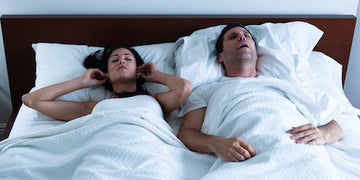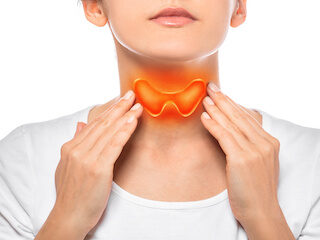by Anthony Benjamin on Oct 12, 2022

The Connection Between Obesity and Sleep Apnea
Consider what happens after you go to bed. Do you wake up with a dry mouth or sore throat, have difficulty concentrating, or still feel tired throughout the day? This could be the result of sleep apnea. In this article, our experts will discuss what you need to know about this sleeping disorder and its connection to obesity.
What Is Sleep Apnea?
 Sleep apnea is a serious sleeping disorder in
which a person’s breathing repeatedly stops and starts. In this cycle:
Sleep apnea is a serious sleeping disorder in
which a person’s breathing repeatedly stops and starts. In this cycle:
- Air stops flowing to the lungs for 10 seconds or more. This means you’ve stopped breathing.
- Your brain then sends your body a signal to wake up and breathe. You take a breath and fall back asleep.
- This repeats throughout the night, and many people with sleep apnea don’t even realize it’s happening.
One type, obstructive sleep apnea (OSA), has a connection to those who are overweight. In this situation, the muscles in the back of the throat have relaxed, resulting in a smaller or closed airway. Obese people have fat deposits and reduced elasticity in the upper respiratory track, which can result in sleep apnea.
Without enough oxygen going to the brain, the body briefly awakens to take a breath for such a short period of time that it’s not remembered. Common sounds that others hear are snorts or loud gasps.
If left untreated, it could lead to health problems. This includes diabetes, high blood pressure, heart attacks, heart failure, and cardiomyopathy, which is a heart muscle disease that can lead to heart failure.
Symptoms of Sleep Apnea
Oftentimes, sleep apnea is recognized not by the patient, but by their partner. That is, unless you have awareness of daytime symptoms. This sleeping disorder can negatively impact one’s day-to-day life, with less energy and increased sleepiness throughout the day. The most common symptoms include:
- Awakening with a dry mouth or sore throat
- Difficulty concentrating
- Difficulty staying asleep (insomnia)
- Excessive daytime sleepiness (hypersomnia)
- Gasping for air during sleep
- Headaches
- Irritability
- Mood disturbances (depression or anxiety)
- Restlessness during sleep
- Snoring
How to Diagnose Sleep Apnea
If you experience these symptoms, talk with your doctor about sleep apnea and see about having a sleep evaluation. A polysomnogram (PSG) is a sleep study that is performed in a laboratory and supervised by a trained technologist. Various body functions are tested during a night of sleep, like brain activity, muscle activity, heart rate, breathing patterns, airflow, and the amount of oxygen circulating in the blood.
While a home sleep test (HST) possibly could be performed instead and done from the comfort of home, it records fewer body functions. It isn’t suitable for everyone, as it only measures breathing and not the actual sleep. This could make the results inconclusive or falsely negative.
The insurance coverage you have may play into the type of sleep test that is ordered. Your provider will likely be able to help you with this.
Sleep Apnea Treatments
Commonly, the first step to treating sleep apnea is the use of a CPAP machine. An additional step could be to lose weight, and those who find this difficult may be good candidates for bariatric surgery.
CPAP
A CPAP (Continuous Positive Airway Pressure) machine has a mask that people wear over their nose and/or mouth as they sleep. Air blows gently to prevent the upper airway tissues from collapsing. Yet, if a CPAP is not used, sleep apnea returns.
Losing Weight
Weight loss reduces the severity and development of sleep apnea. Still, weight loss can be difficult to achieve even with lifestyle changes. This is because sleep apnea can cause weight gain due to increased appetite and metabolism changes.
Restless sleep can impact energy levels. When this happens, people often focus on essential tasks like eating and going to work and refrain from watching what they eat and going to the gym. With a less active lifestyle, people burn fewer calories, leading to a drop in metabolism. If you are overweight and find losing weight challenging,bariatric surgery may be right for you.
If you’re interested in learning more about how sleep disorders can affect weight loss and having more valuable tips on getting the right amount of sleep, watch ProCare Health’s event on How Sleep Affects Weight Loss + 3 Hacks to Get More Sleep.
Speak to Experts at ProCare Health
The experts at ProCare Health are dedicated to helping people live healthy lives. That’s why we provide nutritional supplements for people who have undergone bariatric surgery. If you are considering bariatric surgery, have your questions answered by our knowledgeable team members. Contact us today and see what your future could hold!

Thyroid Health: Obesity & Bariatric Surgery

Why Does Weight Loss Surgery Work?

Find Your Support Systems

